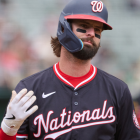In two weeks and three days, teams will be able to expand their active rosters and carry as many as 40 players. It's not a requirement, and I can't remember a team ever carrying the maximum 40 players, but clubs certainly call up extra players in September every year. They'd be foolish not to.
The September call-up system is a polarizing one and there are plenty of people within baseball who don't like playing the final month with a different set of rules.
"You play 80 percent of your season with even rosters and then all of a sudden, you throw that out. It's like playing three-on-six in basketball or 11-on-18 in football," said former Brewers GM Doug Melvin to MLB.com's Mark Bowman way back in 2009. "I don't know of any sport in the world that does it like ours, with this kind of imbalance of rosters. I'd like to find out if there's any other sport that does that at the most important time of the year."
Some have suggested flipping the calendar and allowing teams to use expanded rosters in April rather than September, but that creates some logistical problems because the various minor leagues would have to start their seasons later. Others have suggested allowing teams to recall up to 40 players, then have them designate 25 active players for each game. It's a good idea, in theory.
Personally, I am a fan of September call-ups for a few reasons. I completely understand why many don't like them, but I think they are a net positive for baseball and I'd like to see the current system kept in place. Here are a few reasons expanded rosters are beneficial.
Reward Depth
First and foremost, I'm a fan of rewarding teams with depth. If my third catcher or sixth starter or extra platoon outfielder or spare lefty reliever is better than everyone else's, why shouldn't I be able to take advantage of that? These days it takes way more than 25 players to contend. Teams need depth to use throughout the season, and September is the only chance to show off all that depth at once.
Reward Good Seasons
The minor-league season ends in early September and expanded rosters is an opportunity to reward minor leaguers who have had great seasons. You couldn't do that if rosters were expanded in April. Prospects who have a breakout year or even a veteran guy who showed he still has something left in the tank benefit most from September call-ups. They get rewarded for their good seasons with a month in the big leagues, which in most cases means a substantial pay increase. Positive reinforcement!
Audition Young Players
For non-contending teams looking towards the future, there is no better time to audition young players than September. Some clubs are simply looking to run out the rest of the schedule in the season's final month and it is the perfect time to give a young player a long look. Want to see how that young shortstop handles playing everyday? Or whether that reliever fits into your bullpen next season? September is the time to do if you're a non-contending team. Expanded rosters is an evaluation tool. (Also, I'm sure calling up and auditioning young players keeps some fans interested as the season winds down. That's not negligible.)
Control Workloads
This is big. Teams go to great lengths to protect their young arms these days, and we've seen it taken to the extreme with the Stephen Strasburg shutdown a few years ago. There are going to be more than a few young hurlers approaching some sort of workload limitation next month -- Taijuan Walker, Noah Syndergaard, Luis Severino, Eduardo Rodriguez, Jon Gray, Daniel Norris, Andrew Heaney and Carlos Rodon jump to mind as young starters who may have their workloads watched as the season winds down -- and teams will be better able to control their innings with expanded rosters. Those extra pitchers sure do come in handy. Expanded rosters are both an evaluation tool and developmental tool. Giving clubs the best opportunity to keep young pitchers healthy is a great thing for baseball in the long run.
While I understand why some folks don't like the September call-up system, I'm a big fan for the reasons outlined above. I think they're a net positive for baseball. Rather easily, too. Pennant races aren't decided in September, they're decided over the course of the 162-game system, and as long as all 30 clubs have the same ability to expand their rosters in September, I don't see it as being unfair.






















